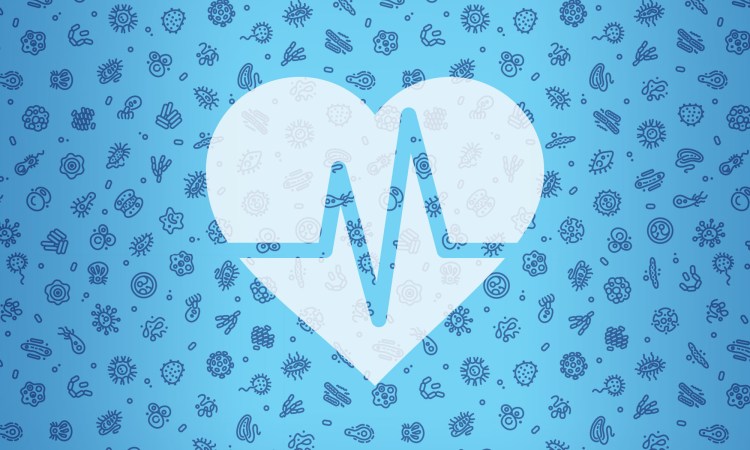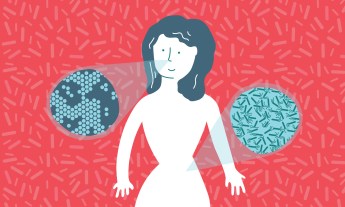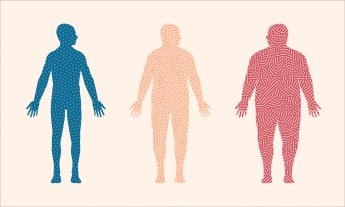
Researchers at Johns Hopkins think they might have come up with a novel way to manage blood pressure. Hint: Microbes.
It’s one of the most eye-opening tangents in recent medical research: Scientists have found that the bacteria living in your gut have an unexpected influence over the rest of your body. The three pounds of microbes we host can affect surprising things like your immune system and even whether you’re obese. Now it seems there might be another body system in which microbes play a part: your blood pressure. Jennifer L. Pluznick, assistant professor of physiology, and her team at the Johns Hopkins University School of Medicine have recently found that there might be a connection between the bacteria in your gut and how your hard-working kidney manages your blood pressure. It’s early days for the research, but Pluznick’s insight could someday help people manage high blood pressure that has no known cause. Here’s a closer look at what Pluznick has found — and where she hopes the work might go.
First, the stats: High blood pressure can be deadly — and it’s relatively common. One in three adults in the U.S. has high blood pressure, according to the National Heart, Lung, and Blood Institute. And when your blood pressure goes out of whack, your chances for heart attack and stroke increase, according to the Centers for Disease Control and Prevention. The most common form of high blood pressure is called primary hypertension, which exhibits no problems in blood pressure-related organs, making it difficult to determine its root cause and prescribe a treatment. That’s why Pluznick’s research is particularly interesting: her work shows that a link between the gut and the kidneys may indicate a new cause of high blood pressure — and possibly, ways to counteract it.
Second, the biology: The kidneys are key to regulating blood pressure. The kidneys are best known for filtering the waste out of your blood and sending it out with your urine. But they also stabilize your blood pressure, constantly tweaking it as you eat, drink and metabolize food. They do this by monitoring the volume of liquid in your body. Think of your veins and arteries as garden hoses; the kidneys work to keep the perfect amount of water in those hoses so they are neither deflated nor overinflated. The kidneys also keep tabs on the amount of salt in your body, because extra salt increases the fluid in your body, which raises your blood pressure. The kidneys can even deploy a special molecule to tell blood vessels to tighten up when necessary to increase the blood pressure throughout your body.
So what does that have to do with the gut? Gut bacteria help metabolize food. As they do this, the bacteria make molecules known as short chain fatty acids, which travel around in your bloodstream to provide energy to most major organs, including the kidneys. Pluznick and her team found short chain fatty acid receptors in cells both inside and outside the kidney that are important in blood pressure regulation. In their work, they focused on two receptors in the kidney: Grp41 and Olfr78. At the beginning, Pluznick says, “We knew that Olfr78 was found in cell types that are important in blood pressure regulation, but, at the time, it was unknown what this receptor was a receptor for.” So she and her team worked to determine what the receptors were receiving — which turned out to be the fatty acids created by gut bacteria. As a test of the connection, the team was able to change the blood pressure of a mouse by injecting short chain fatty acids into its bloodstream.
The upshot: Gut bacteria can influence whether a kidney lowers or raises blood pressure. According to Pluznick, the Gpr41 receptor, which is activated by fairly low concentrations of short chain fatty acids, lowers blood pressure. In contrast, Olfr78 responds to high levels of short chain fatty acids — and increases your blood pressure. How’s it work to have the receptors acting at the same time? Well, when Olfr78 raises your blood pressure while Grp41 is simultaneously decreasing it, the result will be a slower decrease of your blood pressure. It’s like wearing waterwings while swimming with rocks in your pockets; you’ll still sink, but slowly. Low blood pressure can be dangerous too, so the thinking is that Olfr78 is a useful counterforce.
The research results surprised even the scientists. Pluznick and her team weren’t expecting that these kidney receptors would respond to short chain fatty acids from the gut, thus making a link between the kidneys and the digestive microbiome. Then again, Pluznick adds that she is never truly surprised by the kidney, which is responsible for maintaining balance within the body in many different ways. “There are so many fundamental elements and processes that the kidney has to keep an eye on,” she says. “The kidney is just incredibly, incredibly cool.”
Illustration by Sacha Vega/TED.



















